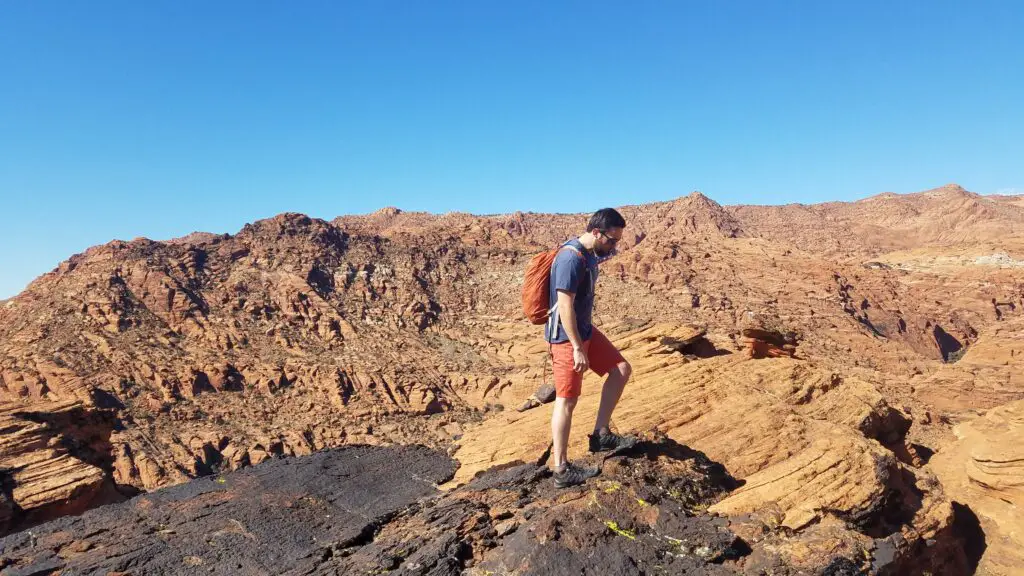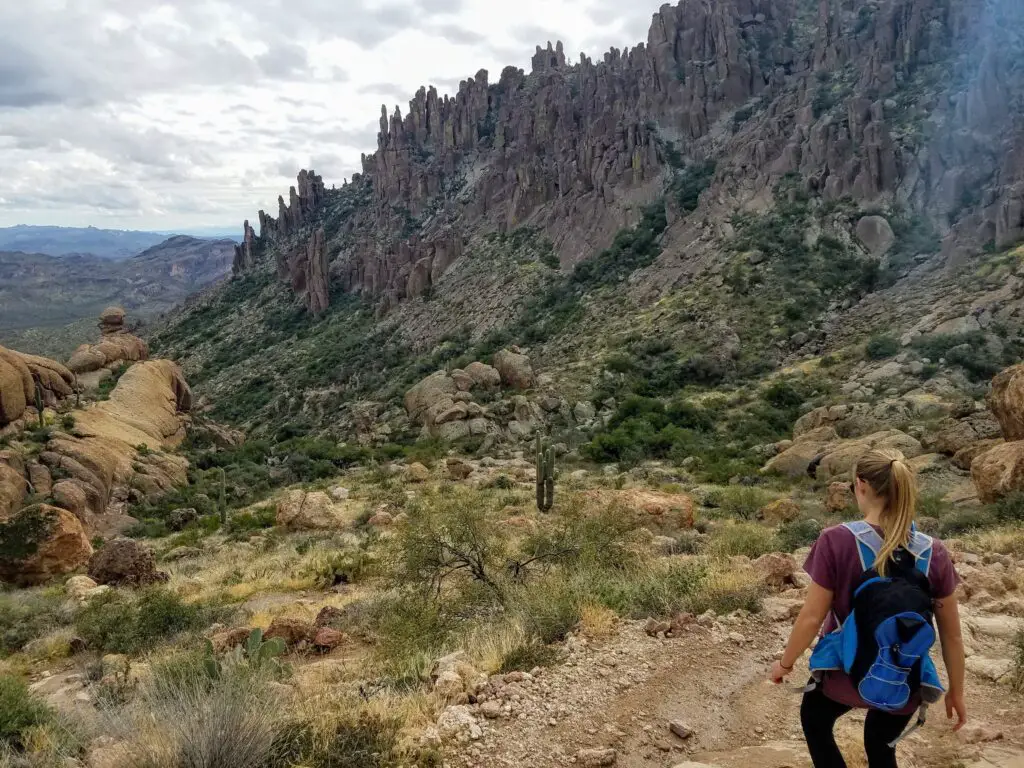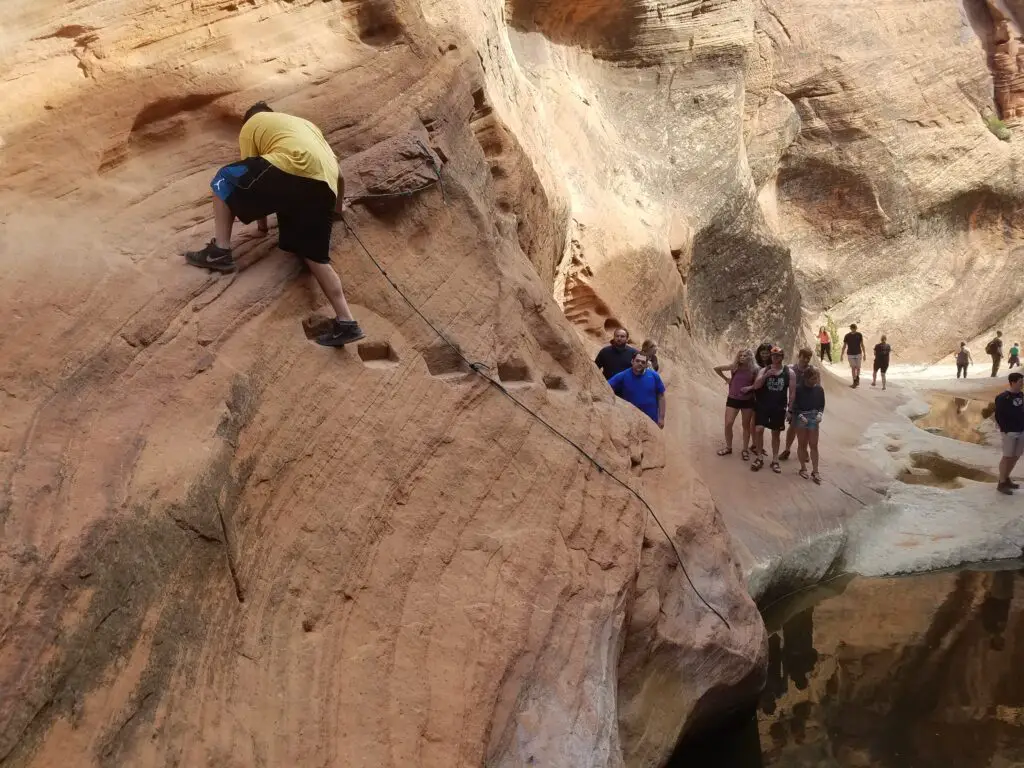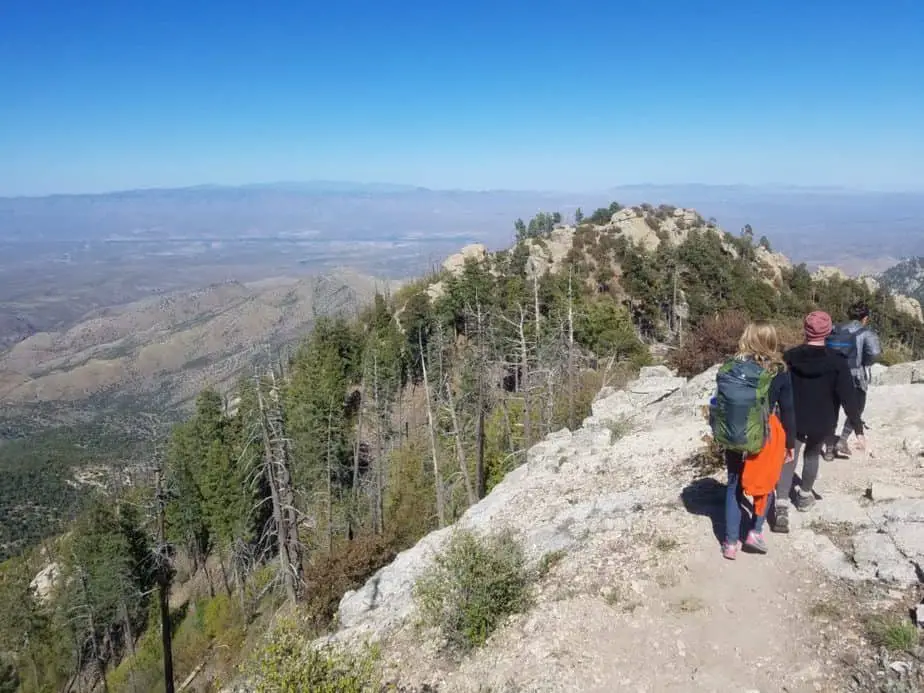Exercise in any form is a crucial part of overall health. Hiking in particular is a great way to get your heart rate up, strengthen muscles, relieve stress, and connect with nature, which brings peace to a lot of people! Hiking can also have an impact on weight loss because it does burn calories and provide other benefits to your physical, mental, and emotional health.
Hiking can play a significant role in your weight loss plan because it is good exercise, it is enjoyable, and it gets your body moving. The best exercise for weight loss is one that you enjoy and will be consistent with. Hiking probably isn’t adequate exercise done by itself unless you live close enough to trails to get out multiple times in a week.
Read on for more information about how hiking can help you lose weight, healthy weight loss tips, and why hikers have different body types!
Will Hiking Help Me Lose Weight?
When most people think about weight loss, they simply think they have to eat less and exercise more. This is somewhat true, but in reality, your body is a complex machine that really doesn’t like to lose weight.
It has lots of fail-safe mechanisms in place to make sure you stay alive, so you really have to focus on taking care of your body and nourishing it properly if you want it to give up the precious fat stores it’s built up.
Do You Have to Exercise to Lose Weight?
At a basic level, weight loss usually occurs when you are in a calorie deficit, meaning you are eating less calories than you are consuming. So, you don’t necessarily have to exercise to lose weight if your total calories burned throughout the day is greater than the calories you are eating.
That being said, creating a large calorie deficit is not a great idea. I like to tell people that it puts their body into “freak-out mode” or “starvation mode” because your body can’t really tell the difference between purposefully not eating enough and being stranded on a desert island without enough food. Large calorie deficits often put your body into compensation mode where it will do everything it can to not lose weight.
Sometimes people notice that large calorie deficits do help them lose weight for a while. However, eating that way and/or exercising that much is usually unsustainable and people typically gain that weight back. Then they find it confusing why the same approach (a big calorie deficit) no longer works for them.
How Can Hiking Help Me Lose Weight?
As a part of creating that calorie deficit, 200-300 minutes of moderate intensity exercise weekly is recommended for weight loss. If you are not used to exercising, just start small and work your way up! Hiking can make up a little bit or all of the 200-300 weekly exercise minutes.
I find that spreading out exercise is the most helpful way of getting in that much physical activity. 300 minutes of exercise is the same as 1 hour, 5 times a week. If you choose to do a long hike that is multiple hours and/or very strenuous, you might need to throw an extra rest day into the mix or just do a few minutes of very light activity, like yoga or a gentle walk.
Hiking is a great form of cardio , which has been shown to greatly improve overall health and wellness. It is an aerobic activity that works to strengthen not only the muscles in your legs and core, but also your lungs and cardiovascular system. For more information on the health-exercise benefits, read my article How is Hiking an Aerobic Activity?
, which has been shown to greatly improve overall health and wellness. It is an aerobic activity that works to strengthen not only the muscles in your legs and core, but also your lungs and cardiovascular system. For more information on the health-exercise benefits, read my article How is Hiking an Aerobic Activity?
Listen to your body, and don’t overdo it on exercise. Pushing your body too hard often results in injury, which will force you to take a longer break from exercising.
Exercise should feel good and nourishing to your body, so if it stops feeling that way, go easier or take extra time to rest! See my article, Why is Hiking So Tiring? for more information.
for more information.
It can also be helpful to mix up your hiking route. Not only will this keep things interesting for you visually, but changing routes will cause your muscles to work in different ways to strengthen your entire body and prevent overuse of certain muscles. If you live in an area with lots of hiking trails, take advantage of the variety of options to explore!

Will Hiking Tone My Legs?
Hiking utilizes many different muscles in your legs, and can be a great activity for toning muscles as opposed to bulking them up. Hikes that incorporate elevation changes and bouldery or uneven terrain serve to strain muscles even further.
Hiking should be paired with other forms of exercise like strength training and high intensity activities like running in order make real progress. A mixture of activities utilizes various sets of muscles and works them in different ways.
Weight Loss Tips for Hikers
Below are a few tips for hikers that are wanting to lose weight:
- Don’t hike on an empty stomach. Fuel your body appropriately before you exercise so that you have energy to work with. Focus mostly on carbohydrates the closer you get to your hike.
- Long hikes may require replenishing carbs during your exercise. Try something that is easy to digest like a sports drink, pretzels, applesauce, a banana, gels and chews, fruit snacks, dried fruit, etc.
- Make sure not to over eat while hiking- many common hiking foods are calorie-dense and it can be easy to accidentally take in more calories than you burn.
- Eat a balanced meal after you hike to give your body the nutrients it needs to recover. Include carbohydrates, protein, and healthy fats.
- Listen to your body’s hunger and fullness cues and also pay attention to how your body is feeling physically. Your body is really good at letting us know what it needs if we just learn to listen!
- Include lots of variety from each of the different food groups. Each food and food group provides different nutrients that your body needs. Focus especially on eating a variety of fruits and veggies for extra vitamins and minerals that are extremely nourishing to your body.
- Focus more on what you can add rather on what you need to take away. Your brain doesn’t do well with a restrictive mindset and prefers to focus on adding in more nutrient-rich foods to your diet.
- Include different forms of exercise. Make sure to include weight-bearing exercises to help you build muscle and therefore increase your metabolism. Find exercises that you enjoy!
- Remember to take care of your body in other ways as well. Get enough sleep, manage your stress levels, develop good relationships with those around you, take care of your oral health, etc.
Why Do Some People Have Trouble Losing Weight?
People have trouble losing weight for several reasons. Here are just a few that I see frequently as a dietitian:
- They are eating too few calories. I know this might sound totally backwards from what you have heard your entire life, but you must eat enough calories for your body to let go of excess weight it doesn’t need!
- They are doing too much exercise and their body cannot recover appropriately. Doing too much exercise sometimes also results in burning excessive calories and not eating enough to maintain what you are doing which also causes problems.
- They are not focusing on nourishing their body and giving it the fuel that it needs when it needs it. Remember, your body has to feel comfortable, safe, and nourished to let go of excess weight it doesn’t need.
- They are cutting out foods and food groups that they enjoy and following an eating pattern that is unsustainable. Cutting things out is not the way to go- it creates an unhealthy mental relationship with food that often will end in overeating that food the next time you have access to it!
- They are trying to lose weight past the point that is healthy and comfortable to their body. This often happens when society sets unachievable beauty standards that harm our body image.
- Lack of sleep, or not managing stress. Everything in your body is connected, which means weight is impacted by more than just eating and exercise!
- There are other medical conditions and underlying problems that have not been addressed. Thyroid disorders, disordered eating, inflammation, medication side effects and more can all play a role in weight changes.
It’s a common phenomenon to not have an appetite after hiking or other forms of exercise. This doesn’t mean you aren’t hungry, it just means your body is working on other things and is distracted from food at the moment.
Even if you don’t feel hungry during or after a hike, it’s important to still eat something to refuel the tank and keep your body out of that “starvation mode.” I wrote more about this phenomenon in my article, Why Am I Not Hungry After a Hike?

What are the Benefits of Exercise?
With such a huge focus on weight loss, it is easy to forget the many benefits of exercise that have nothing to do with weight! It is much more beneficial to aim for these types of benefits rather than hanging all of your success on how much weight you lose. Here are a few of the amazing benefits you get from exercise:
- Improved mood and ability to regulate emotions
- Increased endorphins (feel-good hormones) that help with stress relief, and improved mental health
- Improved cardiovascular health through strengthening of the heart muscle
- Working different muscles in your body to get stronger
- Improved sleep
- Increased bone mineral density and bone strength
- Stronger immune system
- Increased energy levels throughout your day
These benefits of exercise are compounded by the effects of spending time in nature and sunshine, as detailed further in my article, How Many Calories do you Burn Hiking Versus Walking?
What is the Best Exercise for Weight Loss?
The best exercise for weight loss and for overall health is the exercise that you enjoy. Forcing yourself to do exercise that you hate is not going to be sustainable, and reaching and maintaining a healthy weight can only be done by creating sustainable health habits!
Hiking is a great way to get active! If it is something you enjoy doing, then go for it! If hiking is not really your thing, don’t worry- there are plenty of other good options that also will benefit your overall health and help you reach and maintain a healthy weight.
You could also try out a dance class, walk around the mall, play tennis, play with kids or grandkids, shoot hoops outside, kickboxing…the list goes on and on! Of course for weight training I recommend swapping out the occasional hike for a full-fledged backpacking trip !
!
Why are Some Hikers Fat?
It can be difficult for hikers to get out consistently enough to get all of their exercise needs from hiking, so often hikers are the ‘weekend warrior’ type who live a sedentary lifestyle the rest of the time. Occasional sporadic exercise makes it difficult for your body to decide to give up some pounds since it doesn’t feel ‘safe.’
Additionally, as mentioned previously, lots of hiking foods are created with the intent of packing as man calories into as small of a space and weight as possible. Foods like protein bars and trail mix and candy taste great and can play an important role in keeping your energy up, but if you’re pounding a couple of Clif bars during an hour-long hike you’re probably going to consume more calories than you burn.
It’s important to keep that calorie deficit in mind while still adequately fueling your body so that it has the power it needs to perform. Consistent patterns of exercise also make it so your body doesn’t feel like it needs to store up extra fat for the occasional burst of exercise.
We live in a society that is obsessed with losing weight, but the truth is, everyone’s body is a little bit different and even if everyone ate the same way and did the same hikes or other exercise- they would still look different. I suggest taking some of the emphasis off of weight and focusing on just being the best and healthiest version of yourself that you can be.
What is a Healthy Weight for an Adult?
Most of the time when we talk about healthy weight, we think of BMI (body mass index). BMI can be a helpful tool for healthcare providers in assessing large populations because it is an easy, inexpensive, and quick measurement. However, BMI should never be the ultimate determinant of health status because there are so many other factors that affect it.
BMI is calculated just by using a person’s height and weight and does not take into account body composition, genetics or family history, and most importantly- it doesn’t account for any eating and exercise habits.
A higher BMI has been found to be associated with a higher body fat percentage, which is associated with negative health impacts. Higher body fat percentage is often associated with higher rates of heart disease, diabetes, high blood pressure, high cholesterol, etc. Keep in mind that these are just correlations.
It is so important to recognize that being at a higher weight does not automatically mean you are “unhealthy,” just like being at a lower weight doesn’t make you “healthy.” This is a very common misconception that I hear from people as a dietitian.
The pursuit of weight loss is not necessarily a pursuit of health and you don’t have to be trying to lose weight when you are trying to develop better habits and improve your health. Alright, so hopefully I have made my point and hopefully you can recognize the variety of factors that contribute to weight.
This is also a great reminder that anyone can be a hiker. You don’t have to have a certain body shape or be a certain weight to be a successful hiker and enjoy the benefits of exercise and being out in nature.
If you have ever felt like you can’t do something simply because of your weight or how your body looks, remember that all bodies are good and worthy of nourishing physical movement! (If your doctor has not cleared you for exercise based on clinical health problems, remember that that is different than what we are talking about and can be true for people of any weight, so make sure your doctor signs off on exercise before beginning).

How Can I Stop Comparing my Body to Other Hikers?
Do you find yourself comparing your body to that of other hikers, or anyone else? Even more significant- do you find yourself relating your worth to your weight, making judgements about others based on their weight, or letting thoughts about your body affect your mood?
If any of these sound familiar, you would likely benefit from some mindset shifts about weight. Doing the work to develop a positive body image is so worth it and will benefit you in so many ways! Here are some tips for improving your relationship with your body and your relationship with food:
- Reframe your thoughts to focus on believable, positive thoughts. That means you don’t have to automatically believe the thought “I love my body.” Maybe a believable thought you can start with is “my body keeps me alive.”
- Get rid of the scale. It is not helpful to be weighing yourself every day- especially if your mood or eating and exercise habits are determined by the number that you see. If you have made a habit of weighing yourself regularly, put the scale out of sight, or better yet, just get rid of it!
- Refrain from making comments about your body or other people’s bodies. Find other things to comment on- tell someone you appreciate something they did for you or ask about something that has been going on in their life. Train your brain to think about and talk about things other than weight.
- Remove yourself from situations where diet and body talk are affecting you negatively. If you can’t change the subject, you might just need to step away!
- Cleanse your social media feed or take a break from it altogether. Many people don’t even realize how much social media is affecting them negatively until they take a step back from it.
- Many negative thoughts are deeply rooted and come from many years of experiences and beliefs. You may want to work with a therapist to get some help in dealing with and shifting those thoughts and feelings. You do not ever have to do it by yourself!
- Do not eat less or exercise more based on the number you see on the scale. Focus instead on nourishing your body daily, eating enough to sustain what you are doing, and doing what you need to feel energized and strong!
- Give yourself grace. Don’t beat yourself up for what you eat or do (or don’t do). Take everything as a learning experience as you focus on taking care of your body
Summary
Hiking should be something that you do because you enjoy it and it helps you feel good. Yes, hiking can help with weight loss, but if you are only hiking to lose weight, you will be missing out on recognizing so many other benefits!
Take a minute to connect with your body and take note of the benefits you are personally experiencing from hiking like stress relief, improved sleep, better mood, increased energy, etc. Remember that consistency is one of the most important factors for weight loss, so be sure to include various forms of exercise multiple times per week.
Related Questions
How Much Should I Hike per Week to Lose Weight? Hikers intent on losing weight should ensure they get the recommended 200-300 minutes of exercise per week recommended by the CDC. This can be broken up into segments of an hour per day. A balance of hiking as well as other exercises will increase opportunities for weight loss.
How Long Should I Hike to Lose Weight? Hikers should go a minimum of 30 minutes per session multiple days per week in order to lose weight. This activity should be paired with other forms of exercises in order to achieve the 200-300 minutes recommended by health experts.
Can You Get in Shape Just by Hiking? Hiking utilizes several large muscle groups in your body and can be a great starting point or companion to other forms of exercise like weight training or running. In order to get your body in overall good shape it’s important to mix up exercises to strengthen various muscle groups.
Can You Get Lean from Hiking? Hiking can be a good exercise to help trim fat and develop a lean physique. It’s important to remember that body shape and composition are more than just a result of exercise and diet however, as genetics play a moderate role as well. Hiking can be an important part of any exercise routine and is good for overall health.

